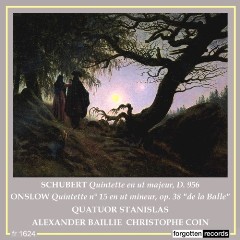MusicWeb International (March 2019)
The Stanislas Quartet has been active in the recording studios over a number of years now and when expanded into the Stanislas Ensemble its repertory expands significantly. Given its base in Nancy, it’s not surprising that it’s especially attuned to French repertory and the first-ever recording of Ropartz’s set of String Quartets was a feather in its cap. Some readers will know that ensemble has recorded much more besides, notably music by Schmitt, Emmanuel, Cartan, Thirion and Sauguet.
But it has hardly neglected the central repertoire, notwithstanding its absence thus far from the commercial discography. This release is a case in point, archive retrievals dating from 1993 and 1995, where the quartet was joined by two distinguished cello colleagues, to perform a brace of quintets written a year apart. One work, in point of fact, is as central to the repertoire as one can get, whilst Onslow – well represented on disc over the last decade or so - is increasingly being seen and heard for the creative and imaginative composer he was.
The earlier concert was given in in Nancy in April 1993 and features the Schubert Quintet where Alexander Baillie joined the ensemble. The pleasingly reverberant acoustic of the Grand Salon offers a warmly cushioned sound for a reading of good, convincing tempi and corporate tone. Sometimes there’s a brief over-brightness to the violin tone but the performance itself is both sensitively shaped and stoically conceived. Dynamics are perceptively judged and the Andante sostenuto played with grave lyricism and the finale with alert rhythm.
Onslow’s quintet is subtitled ‘The Bullet’ and is a bit of autobiography related to the day he was accidentally shot whilst boar hunting. Movements two, three and four express his pain and eventual recovery whilst the opening movement anticipates the events of that night in 1829. It’s a work big in conception but with decorous elegance too in its opening and taut terse, headachey music, with neatly descriptive dolorous runs. The Stanislas and their cellist guest Christophe Coin catch the pious calm of the slow movement with reduced dynamics, excellently calibrated in the Salle Poirel in Nancy, as well as the Beethovenian recovery from illness in the finale where the music tumbles over itself in renewed zest for life.
The notes consist of a biography of the Stanislas – one page, in French and English translation. If you only know of the quartet in connection with French repertory, you can anticipate its excellence in Onslow and catch it in a fine performance of the Schubert.
Jonathan Woolf


